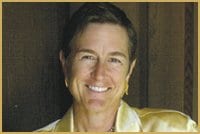As soon as Dr Brian Fitzsimmons finished medical school, he knew he “wanted to be part of something bigger.” As a gay doctor, he wanted to be part of improving health services for gay, lesbian, bisexual and transgendered people, and as a gynecologist, he is particularly concerned with queer women’s health issues.
“I hear [from my lesbian patients] that lots of doctors assume they’re straight,” Dr Fitzsimmons says. “They assume that they need birth control, that they want babies, that they have penetrative sex. A lot of patients say they feel uncomfortable.”
Early on in his practice, Fitzsimmons joined the Gay and Lesbian Medical Association (GLMA). Through the association, he met leaders in the American gay and lesbian health movement, including Dr Kate O’Hanlan.
O’Hanlan is an oncological gynecologist (a specialist in cancers that affect women) from California who focuses on lesbian and trans (FTM) health issues. Her goal is to eliminate barriers to healthcare for these groups through education and policy change.
Fitzsimmons, together with Sarah Sample of the BC Cancer Agency, has organized a series of presentations by O’Hanlan in Vancouver this September. Most will be for healthcare professionals, to help them be more aware of lesbian gynecological issues and the barriers to healthcare caused by homophobia. On Sep 6, O’Hanlan will give a presentation for lesbians and their allies who are dealing with cancer–this event is open to the public.
Fitzsimmons points out that lesbians often have an elevated risk of ovarian and uterine cancer because they are less likely to have babies or to breast feed. O’Hanlan writes on the GLMA website that “Lesbians have the richest concentration of risk factors for breast cancer [of] any subset of women in the world.”
Research suggests that lesbians are more likely than straight women to smoke, carry extra weight, and not have regular breast exams–all of which increases the risk for breast cancer.
Just as important as these risks, however, is homophobia. O’Hanlan has written and spoken widely about homophobia as a health hazard. In an interview in The New York Times she says, “If you’ve experienced homophobia, you expect the doctor to disdain you, not have time for you or might be trying to change you, and you will be less likely to go for help. Many, many gay women say they don’t go for healthcare because they’ve had negative experiences with discriminating doctors, or even with well-meaning ones who unintentionally marginalized them.”
Fitzsimmons’ goal in bringing O’Hanlan to Vancouver is to increase access to healthcare, particularly gynecology, for lesbians, bisexuals and FTM trans people. If doctors and other health professionals learn more, “we can be more welcoming.” He encourages members of the queer communities to come to O’Hanlan’s presentation to take part in the ongoing dialogue about the particular healthcare needs of queer women.

 Why you can trust Xtra
Why you can trust Xtra


